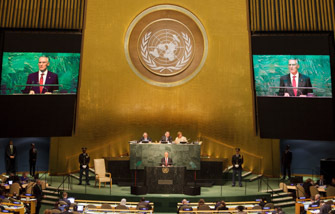
In 1965, the United Nations Member States subscribed the Declaration on the Promotion Amongst Youth of the Ideals of Peace, Mutual Respect and Understanding Between Peoples. This document was in effect the worldwide emergence of what we may consider as the recognition of Youth as a social group particularly open to the blossoming of such universal values.
Two decades later, the United Nations General Assembly declared 1985 as the first International Youth Year, under the theme Participation of Youth, Development and Peace. Thus international emphasis was placed on the relevant role of youth in the construction of a fairer, more prosperous and friendly World.
Portugal has been at the forefront of the valuing of youth’s role in society.
In August 1998, very relevant international events were carried out in Portugal in this scope, namely the first World Conference of Youth Ministers and the World Youth Forum. Following these events, UNO accepted Portugal’s proposal to establish 12 August as International Youth Day.
Documents such as the “UN World Programme for Youth in the Year 2000 and Beyond” and “The Lisbon Declaration over Youth Policies and Procedures” underline the relevance of consulting and participation instruments, such as access to information, as premises of a youth policy and the recognition that youth is a positive strength with enormous potential to contribute towards social development and progress.
There are currently 1500 million youths, approximately 25% of the world population. To find answers to their concerns and ambitions must be a priority of the world’s political agenda. In a stage when the setting up of the Post 2015 Agenda and the establishing of the Objectives of Sustainable Development are under consideration, it is important that a new attitude is ensured regarding intergenerational justice. Challenges which are profiled nowadays are not overcome without a partnership involving youth, International Organizations and national, regional and local governments.
Approximately 150 million youths exist in the Iberian American area. This is the largest ever Iberian American young generation.
The legitimate ambitions and expectations of Portuguese and Iberian American youths regarding their future demand that the State and society are capable to generate opportunities in order that the new generations fully assume their role as active citizens. The promotion of youth’s social inclusion must be placed at the centre of political activity, developing and implementing a number of definitive answers that strengthen the linkage between the diverse State bodies and civil society.
It is in this context that, in 2015, we celebrate the 30th anniversary of the First International Youth Year, an excellent opportunity for the launching of the Iberian American Youth Programme – “Iberjovens”.
I congratulate OIJ (International Youth Organization), SEGIB (Iberian American General Secretariat) and UNDP (United Nations Development Programme) for this initiative and greet the adhering counties. I am delighted that Portugal has backed the Programme since its beginning and now shoulders the responsibility as Deputy Director of the Intergovernmental Committee.
I am anyway very pleased that Portugal has been chosen for the public international presentation of the Iberjovens Programme.
And, on another hand, a matter of pride for our Country is the recognition of the history of youthful work and dynamics of the city of Braga, 2012 Youth European Capital and headquarters of the Portuguese Erasmus + Youth Programme in action Agency, of the European Union, and is now the city chosen as the 2016 Iberian American Capital of Youth. Braga is to be congratulated.
I also congratulate the Iberian American Youth Organization (OIJ), the only multi-governmental body in the field of Youth, for the important work it has been developing, specifically in the institutional strengthening of the national youth organizations and in encouraging youth participation, cooperation and interchange.
In this context I must emphasize the importance of youth in the assertion and consolidation of the Iberian American area. Not just because of its demographic dimension, but also because of its mustering, constructive and participative capability within society. As happens with the Erasmus Programme, in Europe, stimulus must be given to initiatives and programmes that encourage youth mobility, duly adapted to the realities of the Iberian American area.
Ladies and Gentlemen,
Youth has been an unswerving reference since the beginning of my mandates. As President of the Republic I launched many challenges to Portuguese youth.
With them I had the opportunity to carry out several initiatives in various areas, and was able to ascertain, on site, how the new generations design new trends for Portugal.
I could not be more in tune with the “Iberjovens” Programme presented here, today, since I have often called to mind the need to involve the new generations in the measures established in their respect. Hearing them is not enough, it is necessary to have sufficient courage to know how to involve and allow them to take part in the political and civic construction of the future of our countries.
I fully believe in our youth, and in the relevance of the Iberian American area.
Before ending I thank you sincerely for the generous remarks you have addressed me. Iberian American youth can count on me, now and in the future, in order that public powers hear and recognize their concerns, their ambitions, their issues, and the course they propose for their countries. They are the builders of hope for our countries. Theirs is the capability to invent a better future.
My deepest thanks to you all.
© 2006-2016 Presidency of the Portuguese Republic
You have gained access to the records of the Official Site of the Presidency of the Republic from 9 March 2006 to 9 March 2016.
The contents available here were entered in the site during the 10 year period covering the two mandates of President of the Republic Aníbal Cavaco Silva.